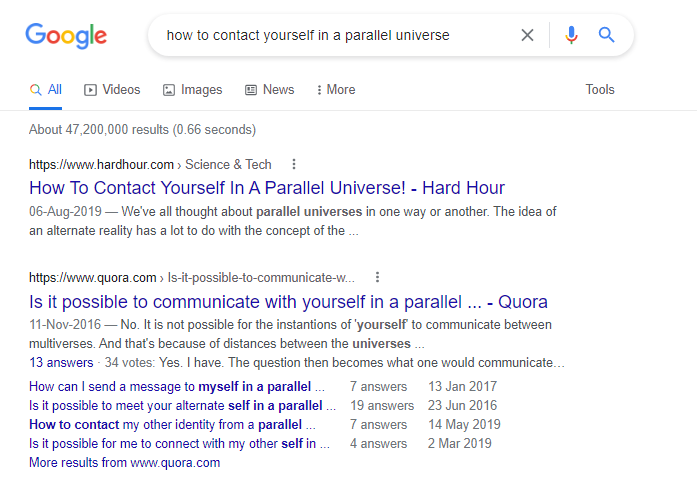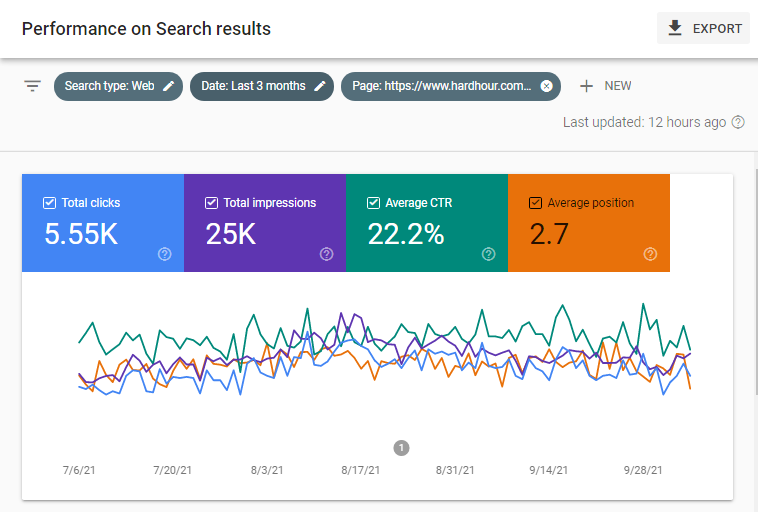Address
304 North Cardinal St.
Dorchester Center, MA 02124
Work Hours
Monday to Friday: 7AM - 7PM
Weekend: 10AM - 5PM

Learn What are Keywords? Keywords are the words and phrases that people use to find what they’re looking for in search engines. For instance, if you wanted to buy a new jacket, you might search for a “men’s leather jacket” on Google. That phrase is still a keyword, although it contains more than one word. Of course, this word is rarely used outside of the SEO profession. The majority of people would refer to these as Google searches or inquiries. Just keep in mind that keywords are interchangeable with both of these terms.
Keywords are crucial because they can help visitors find your website when they type them into search engines.
If you Google “how to contact yourself in a parallel universe,” for example, we come up first:

Because this term receives an estimated 4,500 monthly searches in the United States, ranking first on Google sends a lot of traffic our way.

In fact, in the previous month, we’ve received over 5500+ visits from this term.
How to appear in Google for certain search terms?
Showing up at the top of Google for a relevant keyword generates lots of traffic, but how do you do that?
Pay-per-click (PPC) is when you pay Google to have your website appear in search results for certain keywords. If you sell writing services online, for example, you could bid on that term and appear at the top of Google’s search results when users type it in.
PPC (Pay Per Click) advertising is what it’s called. You can choose keywords to bid on Google’s marketplace. After that, Google will show your ad in the search results. Google costs you money every time someone clicks on that ad and visits your website. Because paid results are advertising, you can discern them apart from organic results.
The practice of optimizing your web pages so that they appear in Google’s organic results is known as SEO. And Google’s mission is to rank the most relevant, best-performing results for each search query.
You’ll get a steady stream of ‘free’ views to your website if Google considers your page the “best” result for the phrases.
For example, Google estimates that the hard hour blog receives 33,000 organic visits per month.
The majority of individuals have a general concept of the keywords they want to rank for in Google. However, it is impossible to know all that individuals look for. That’s why doing some keyword research to come up with new keyword ideas is beneficial.
There are several options for doing this, but the simplest is to use a keyword research tool.
The majority of these tools function in the same way. Seed keywords are a few broad keywords linked to your industry that you enter, and the tool returns some related keyword ideas. Let’s imagine you’re in the business of selling headphones online. “Headphones,” “earbuds,” “earphones,” and “headset” could be some of your seed keywords.
A complete tutorial on how to find these keywords will be available once you understand all these basics. Don’t Worry!
Once you find a list of keywords after doing keyword research using tools. You will clean the list and choose only keywords that match the following criteria discussed in this guide. Nobody can rank for every keyword, and no one can bid on every keyword. As a result, it’s critical to pick your battles carefully. Let’s take a look at several keyword metrics and qualities to see which ones are the greatest.
More on this later in the Keyword research tools tutorial.
To optimize for keywords, most sources
recommend that you do the following:
Include the keyword in the title tag
Include the keyword in the URL
Mention your keyword throughout your page
Include long-tail keywords in your copy
However, we will discuss it in detail in an on-page and off-page SEO lecture. Don’t worry we will get you through this.
Although many of those things make sense, they aren’t the primary technique to optimize for a term. Matching search intent is the most effective strategy to optimize for a keyword. We touched on this briefly previously, but it’s worth repeating because it’s critical.
It’s probably not going to happen if you try to rank for “cast iron skillet” using a blog post. Searchers are in the buying phase, not the learning mode, according to Google. As a result, the first five results are all eCommerce product and category websites.
However, generating the proper type of content isn’t the only way to match search intent. You could also discuss the things that searchers anticipate seeing. Let’s imagine you want to rank for the term “online earning.”
You can tell from the current top-ranking pages that searchers prefer blog posts, so that’s the type of material you’ll need to develop. But what should you write about, exactly? What should your post’s angle be? Looking at the top-ranking pages will give you an idea of this. Almost all of the posts in this scenario use the same approach.
We will discuss it in detail, specifically in the on-page SEO guide.
You may have come across the term long-tail keywords if you’ve read anything about keyword research before. The majority of guides classify these as keywords with a large number of words, but this isn’t exactly correct. Long-tail keywords are search queries that have a low amount of individual searches. Longer, more specialized keywords do have lower search volumes, but one- and two-word phrases can also be long-tail keywords.
Long-tail keywords are also said to be simpler to rank for. This is sometimes true, but not always. It’s more accurate than “supporting long-tail keywords” for what we call “topical long-tail keywords.” Confused? Let’s take a look at these two groupings in more detail.
| Popular Keywords | Non-popular Keywords |
| Lose weight | How to reduce weight in under six months. |
| Reduce weight | Ways to reduce weight by controlling diet ad exercise. |
| Slim body | How to get a slim figure with little effort |
| Obesity | Ways to reduce weight and get rid of obesity |
| Earn online | How to earn online by working from home? |
The above table shows long tails keywords or infamous keywords because their traffic volume is lower as compared to short keywords. However, they are difficult to rank for and sometimes impossible for newer websites or blogs to rank.
We will learn more about them in Keyword Research Guide alongside Keywords Tools usage.
Topical long-tail keywords are those with low individual search volumes that represent the most common method of finding information on a particular subject.
The query “Production cannibalization” is a nice example of a topical long-tail keyword.
Why? Because it represents this process in few words “Cannibalization: The reduction of the sales of a company’s own products as a consequence of its introduction of another similar product.”
Keywords are the foundation of SEO. You can’t possibly create or optimize content for search engines unless you know what people are searching for and what they want to see. Therefore, you must learn our lectures on Complete Keyword Research Guide.